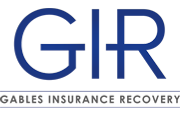
There have been a large number of reopened claims related to Hurricane Irma. Reopened claims negatively impact re-insurers. Re-insurers are insurance companies that insure the risks of other insurance companies. Everest Re Group, Ltd., is one of the re-insurers that was negatively impacted by these reopened claims, losing more than 70 percent of their net worth. Many of the claims that they assumed were actually prematurely closed, not because they received false positives from their clients, but because their clients tried to settle the claims before policyholder’s final bills came in. This led to the policyholders reopening their claims as they received less money than they actually needed. Adesso, the president of Everest Re Group said: “Settling claims quickly was initially a sound strategy, but what we now know is that this approach left our clients vulnerable when the actual repair bills came in higher”.
Everest Re Group took this approach because there were a substantial amount of claims filed that they wanted to promptly resolve. There were consequences in handling claims in this manner as policy holders were not properly indemnified, which resulted in reopening of claims. Like most insurers, Everest Re Group was not expecting nor were they experienced in dealing with simultaneous events. This lead to a significant loss, as their pricing wasn’t up to par with to balance out the amount of money they had versus what was due to their clients. The lack of experience on their part is what led to report the substantial loss to their net worth.
Everest Re Group is not the only reinsurer that bottomed out in the second quarter, Aspen Insurance Holdings, Ltd., found itself in a similar situation. Aspen Insurance Holdings did do better in their second-quarter underwriting results, both in insurance and reinsurance segments. Aspen’s CEO, Chris O’Kane, said they were able to lessen the damage because of “careful client selection in Florida”. Undercapitalized companies sometimes do not have many claims adjusters and when something like this happens, they end up paying more money to under qualified independent adjusters – also referred to as field adjusters – who don’t have the experience or tools to adequately adjust claims. This, in turn, leads to policyholder claims not properly adjudicated due to an inexperienced independent or field adjuster. The carrier’s adjusters are supposed to know how to properly document the loss in order to report back with it to the carrier for processing of insurance proceeds to their insureds. These field adjusters are the boots on the ground; carrier’s eyes, hands and feet, if you will – if they turn the blind eye to the losses that are too complex or seem too small, carriers can’t adjust appropriately. They are the middleman between the policyholder and the insurance company. If carriers had experienced and honest adjusters on the field they could indemnify their policy holders while also protecting insurance companies from unnecessary financial liability.
As a home or business owner, how do you know if the independent or field adjuster is doing what they need to? Policyholders have the option to hire a public adjuster. A public adjuster will represent the policyholder and ensure claims are appropriately documented, coverages are understood and that the insurance company does what it promised to when it sold its policy – provide coverage. Policyholders shouldn’t go at this alone, the carrier has their hired guns – policyholders should have experience on their side.
We have seen this repeatedly, inexperienced property adjusters not accurately scoping and evaluating the losses. If you believe you were underpaid for your hurricane loss, contact us for a free consultation at 1-877-278-5566

Leave a Comment